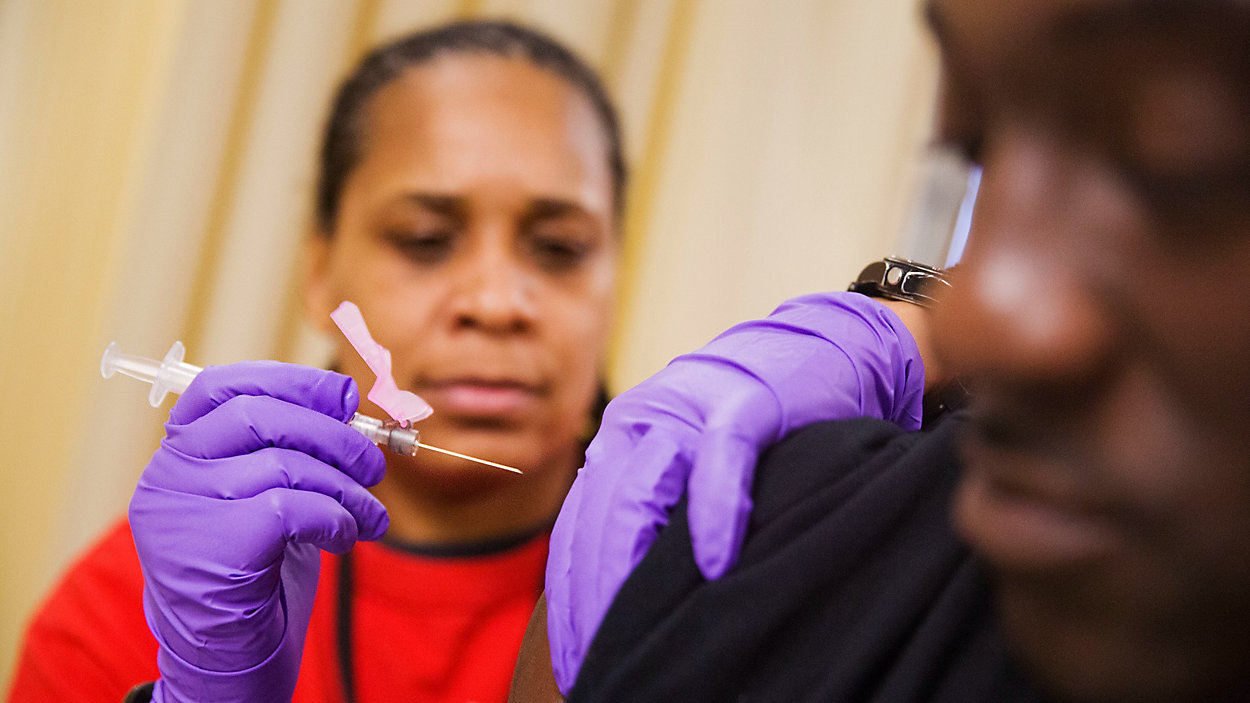As the holiday season ramps up, health experts across the country are urging people to get vaccinated against COVID-19, the flu, and other illnesses before attending gatherings and traveling to protect themselves and vulnerable loved ones. A convergence of respiratory viruses, including RSV, the flu, and COVID-19, has hospitals strained, with cases rising nationwide.
Surge in Viruses Sparks “Tri-demic” Warnings
A trifecta of respiratory diseases is hitting hard and early this year, raising alarms from coast to coast. RSV, or respiratory syncytial virus, is spiking at unprecedented levels for this time of year, packing children’s hospitals and overflowing pediatric wards [1]. Meanwhile, flu season came on fast and furiously, nearing a 10-year high for this point in the season [2]. At the same time, new Omicron subvariants are driving up COVID-19 hospitalizations heading into the holidays [3].
This triple threat of simultaneous spread has hospitals nationwide operating over capacity, with some setting up overflow tents to accommodate the surge in patients. The crisis illustrates the ongoing challenges of combating seasonal respiratory illness and protecting vulnerable groups.
Holiday Gatherings Raise Infection Risks
With Christmas just two weeks away, public health experts are underscoring the need for prevention measures. Indoor holiday parties and family gatherings threaten to turn festivities into viral super-spreader events.
Dr. Greg Conner, a Dallas physician, notes the looming “perfect storm” with people letting down their guard at a most inopportune time: “We want to enjoy the holidays, but we also have to remember – there’s a lot of sickness going around right now.” [4]
Travel plans and holiday parties could easily incubate and spread these viruses among partygoers and families. Vulnerable populations like young children and the elderly face high risks for complications.
A patient receives a flu shot. Health experts advise getting vaccinated at least two weeks before holiday travel or gatherings. (AP Photo)
Vaccination Push Underway, But Challenges Remain
Health organizations nationwide have mounted public awareness campaigns to promote vaccines before holiday gatherings and trips ramp up. Messaging highlights that it’s not too late to get protected against this triple threat of bugs.
“The key time is now,” said Dr. Ashish Jha, White House COVID-19 response coordinator. Vaccination “would really help people to stay safe as they enter the holiday season” [5].
| Vaccine Type | Ideal Timing |
|---|---|
| COVID-19 | At least 2 weeks before travel or gatherings |
| Flu | At least 2 weeks before travel or gatherings |
| RSV | No vaccine available yet |
Table: Expert-recommended vaccination timing before holiday activities and trips
However, uptake on the latest COVID-19 bivalent booster and annual flu shots remains lower than public health targets. Continued COVID fatigue and mixed messaging have resulted in vaccination stagnation. Additionally, there is no available vaccine yet for RSV, which sent over 70,000 children to hospitals last year.
Pediatric hospitals are overwhelmed with this year’s early and potent RSV surge. Breakthrough cases in COVID-19 and flu underscore that vaccines alone cannot eliminate risk, especially for vulnerable groups like the immunocompromised.
Nonetheless, experts emphasize that shots can still reduce infection severity, preventing the worst outcomes. “Some protection is better than no protection,” summarized Dr. Natasha Bhuyan of One Medical [6].
Preventive Measures Still Key to Reducing Risks
Beyond vaccination, authorities advise Americans to keep taking preventive steps against respiratory illness exposure and spread:
- Wear high-quality, well-fitted masks in crowded indoor settings
- Improve indoor ventilation and air filtration where possible
- Practice good respiratory etiquette with covering coughs/sneezes
- Perform frequent, thorough hand hygiene
- Stay home and isolate when sick to avoid infecting others
While pandemic fatigue has eroded compliance with such measures, experts advise bringing back these commonsense precautions over the high-risk winter viral season.
“Don’t wait until people are severely sick to start taking some simple and easy precautions,” said Dr. Ali Mokdad of the University of Washington [7].
Bracing For More Surges Post-Holidays
With the year-end holidays just ahead, infectious disease experts anticipate even larger ascending waves of flu, RSV, and COVID-19 through January and February. The current “tripledemic” surge reflects merely the opening weeks of the typical winter respiratory virus season.
Colder weather drives activities indoors, while holiday travel expands opportunities for outbreaks nationwide. Schools closing for vacation also suspends a key microbiological surveillance network.
CDC tracking models indicate flu and RSV cases will continue rising in most regions, while hotspot COVID-19 surges track the spread of new Omicron sublineages. Authorities expect further escalations of hospital pressures from this triple whammy of viruses in the coming months.
“Stay vigilant,” summarized Dr. William Schaffner of Vanderbilt University Medical Center [8]. “All three of them are out there spreading.”
Getting vaccinated, layering protection measures, and avoiding sick contacts remain our best defenses this respiratory virus season. But conditions promise to get worse before they get better.
In summary, health authorities nationwide are urgently advising Americans to get vaccinated against COVID-19 and the flu at least two weeks before holiday travel and gatherings. A triple threat of circulating respiratory viruses has hospitals strained and children’s wards overwhelmed. While vaccine uptake remains suboptimal, shots can still reduce infection severity alongside other protective measures. With holiday gatherings on the horizon, this could be our last chance to bolster defenses before winter viral spread escalates further post-holidays. Officials caution the surge has only just begun.
To err is human, but AI does it too. Whilst factual data is used in the production of these articles, the content is written entirely by AI. Double check any facts you intend to rely on with another source.



